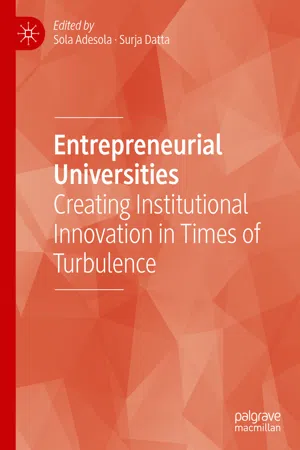Universities are at the heart of knowledge production, dissemination, and exploitation processes within the society. Acknowledging conceptual frameworks such as the Diamond Model (Porter 1991), National Innovation System (Freeman 1995; Nelson 1993; Chaminade et al. 2018), and Triple Helix (Etzkowitz and Leydesdorff 2000; Leydesdorff and Van den Besselaar 1994; cited in Leydesdorff and Meyer 2006), Datta and Adesola (2018) pointed out that the importance of universities has increased, and not lessened, with the lowering of barriers of international business. At the same time, recent events like Brexit and the COVID-19 pandemic have shaken the accepted view that globalisation is a linear trend of ever-increasing connectedness between nations; if nothing else, these global challenges have made the macro-environment much more uncertain and unpredictable.
Policymakers often exhort universities to be more entrepreneurial, but considerable ambiguity exists in the literature about what it means to be an “Entrepreneurial University”. A very narrow conceptualisation of “Entrepreneurial University” equates entrepreneurial activities with commercialisation of university research (Shane 2004; Alexander et al. 2015). A very broad interpretation can incorporate any initiative for change undertaken by the university to respond to market conditions (Alexander et al. 2015; Sperrer et al. 2016). We suggest that as universities are primarily in the business of knowledge production, dissemination, and exploitation, its entrepreneurial behaviour needs to be conceptualised within this particular context. The institutional perspective is useful here. Institutions are “rules of the game” which simultaneously constrain and facilitate interactions of the key players.
The idea of the “Innovation Triad” focuses our attention on the institutional environment that governs knowledge production, dissemination, and exploitation and identifies the key actors: rule makers (RMs), knowledge entrepreneurs (KEs), and knowledge incubators (KIs) (Datta and Adesola 2018).
Policymakers (Rule Makers) take a leading role in setting up the “rules of the game” (North 1991). Typically, but not always, they are government bodies that set out policies which act as constraints and enablers for the players. The players themselves can be classified into two broad groups: Knowledge Entrepreneurs and Knowledge Incubators.
Knowledge Entrepreneurs convert ideas/concepts into products, and services that are put into societal use. Typically, but not always, they are private, for-profit enterprises. Knowledge entrepreneurs specialise in exploitation of knowledge for financial and/or social rewards.
Knowledge Incubators deal with knowledge. They create new knowledge, act as repositories of existing knowledge, and disseminate knowledge. Typically, but not always, they are universities, research institutes, think tanks, and learned societies.
The way RMs, KEs, and KIs interact with each other is mainly determined by formal institutions and informal norms (North 1991), and both together constitute the “rules of the game”. The formal institutions are the written rules, while informal norms constitute the unwritten code of conduct, which influences the behaviour of key players. The nation is still the natural boundary for the Innovation Triad as laws, regulations, directives, and informal norms continue to differ significantly across national boundaries. However, conceptually there is no reason for the Innovation Triad to transcend national boundaries. Indeed in Europe, one can already see the contours of an emergent EU-wide Innovation Triad, facilitated by a genuine supranational entity (the EU), and shared cultural norms.
The institutional perspective on innovation shifts the focus from the “heroic inventor” to the interactions of different constituent elements of the environment. Moreover, the constituent elements are more diverse than those specified in conventional system theories of innovation. Innovation is after all a key marker of all human societies, even those that do not have well-defined actors such as “government”, “industry”, and “academia”. Knowledge Entrepreneurs, for example, can be individuals or teams or organisations (a collection of teams).
The institutional or “rules of the game” approach to understanding the innovation ecosystem has several benefits. First, it allows identification of different classes of players and explication of their roles in the “innovation game”. Second, it alerts us to the fact that players’ behaviour is guided both by constraints and incentives that pervade the system, and this knowledge facilitates our search for these variables. Third, an understanding of the rules, players, constraints, and incentives that are prevalent within the system allows for informed policymaking. The institutional perspective is useful for policymaking that seeks to change the behaviour of actors, as it focuses on rules, incentives, and constraints.
The chapters in this book either illustrate the institutional environment of knowledge production, dissemination, and exploitation, and/or explicate the roles of key players (RMs, KIs, and KEs) within it.
The Structure of the Book
Proceeding from this introductory chapter, the book follows a three-part structure, starting at a macro level (institutional environment) and then progressively focusing on meso- (inter-organisational) and micro- (intra-organisational) level aspects of the Entrepreneurial University. Chapters included in Part I explore the institutional environment, whilst in Part II the interrelationships between Knowledge Entrepreneurs and Knowledge Incubators are investigated. Chapters in Part III are focused on one specific aspect of the entrepreneurial university (entrepreneurial education), demonstrating how it manifests itself in practice.
The chapters in this book volume illustrate the complex interplay between Rule-Makers, Knowledge Incubators, and Knowledge Entrepreneurs which fosters innovation and entrepreneurship within the society. These contributions also help to generate a richer and more nuanced perspective of entrepreneurial university. This book makes both theoretical and empirical contributions to the body of knowledge that focuses on university–industry–government interactions.
Part I: Macro Level—Institutional Environment
In Part I, we look at the institutional environment that concerns itself with knowledge production, dissemination, and exploitation.
In Chap. 2, titled “The Status of Innovation in Africa’s Development Strategy: Where Should Science and Technology Fit In?”, Clark et al. provide an overview of the evolution of the idea of a National Innovation System in the African context. The chapter explicates the reason behind the shifting of emphasis from “science and technology” to “science, technology, and innovation (STI)”. The critical perspective t...
